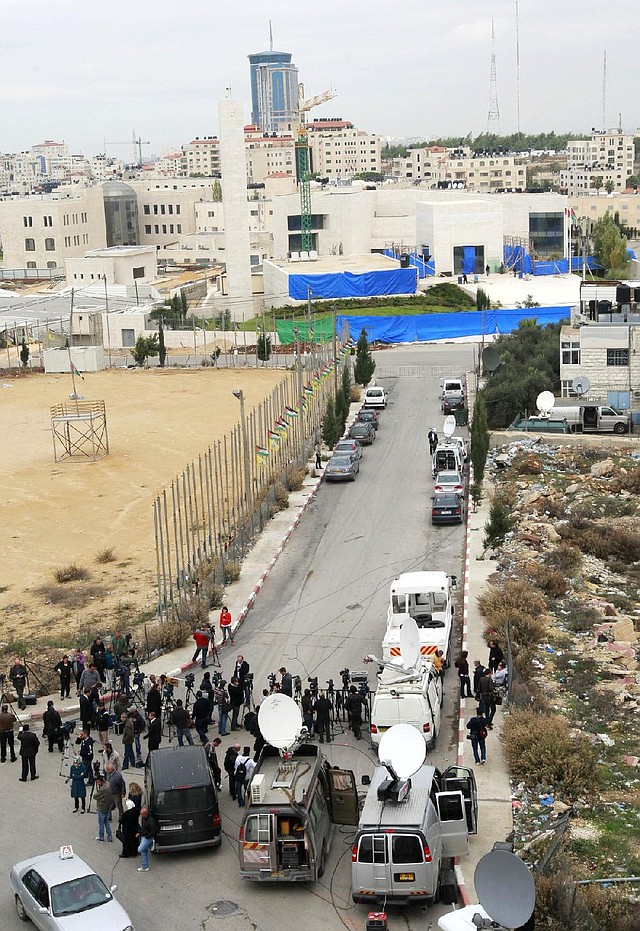Samples taken of Arafat’s body
Swiss, French, Russian experts to look for isotope, other toxics
Journalists wait Tuesday on the road leading to the mausoleum of Yasser Arafat in the West Bank city of Ramallah as authorities exhume the former Palestinian leader’s remains in an investigation into his death.
Wednesday, November 28, 2012
JERUSALEM — Remains of Yasser Arafat, the longtime Palestinian leader who died in 2004, were exhumed from his tomb in the West Bank city of Ramallah on Tuesday as part of an inquiry into whether he might have been poisoned, Palestinian officials said.
The probe was ordered after an investigative report on the Arabic satellite channel Al-Jazeera in July presented what it said was evidence of possible poisoning, reviving suspicions surrounding Arafat’s death.
The report prompted Arafat’s widow, Suha Arafat, to call for an exhumation. It was authorized by Mahmoud Abbas, president of the Palestinian Authority, which governs parts of the West Bank.
Palestinian officials have long accused Israel of poisoning Arafat, a Nobel Peace Prize laureate who personified dreams of Palestinian statehood and over decades shifted from embracing terrorist tactics to negotiating a peace deal. Israeli officials emphatically deny the claims.
Samples from Arafat’s body were taken at dawn at his tomb in the presidential compound and given to French, Swiss and Russian experts, who will examine them in their home countries, officials said. Results are not expected for several months.
“The process and the work of the experts began early in the morning, and as far as I know, everything went well, and they were able to collect what was needed,” said Nour Odeh, a spokesman for the Palestinian Authority.
The area around the burial site was hidden from public view by blue tarpaulins. Palestinian officials laid wreaths at the tomb after it was resealed.
Abdallah Bashir, head of the medical team for the Palestinian committee that is investigating Arafat’s death, told reporters that 20 samples had been collected. He said the foreign experts have been asked to determine whether any type of poison may have caused Arafat’s death.
Arafat died in November 2004 at age 75 in a French military hospital that he had been flown to from Ramallah about two weeks earlier, after his health deteriorated. He had been confined to his Ramallah compound by Israeli authorities for more than two years during the second Palestinian uprising.
Medical records showed that he had died from a stroke caused by a bleeding disorder stemming from an underlying infection that was never identified.
The French hospital found no traces of poison. But in its televised report, Al-Jazeera said it had turned over some of Arafat’s personal effects — including clothing he had worn before his death, his toothbrush and his trademark black-checked head scarf — to the University of Lausanne’s Institute of Radiation Physics in Switzerland, which tested them and said it found unusually high levels of the very toxic radioactive isotope polonium-210. The items, stored for years, were given to the television channel by Arafat’s widow.
Polonium-210 was identified as the substance that killed Alexander Litvinenko, a former KGB agent who became a critic of the Russian government. Litvinenko died in 2006 after being poisoned in London.
After a formal complaint lodged by Suha Arafat, French authorities in August opened a murder inquiry into Yasser Arafat’s death.
The director of the Swiss institute told Al-Jazeera that Arafat’s remains would have to be examined to corroborate any suspicions of poisoning.
But polonium-210 decomposes rapidly, and it was unclear whether the samples taken Tuesday, eight years after his death, would provide any conclusive evidence.
Front Section, Pages 7 on 11/28/2012
